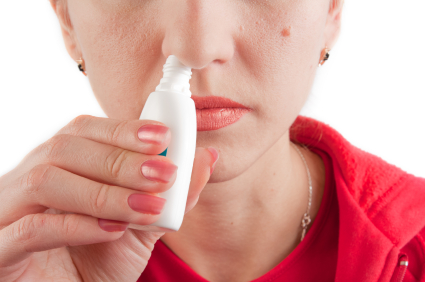
Decongestant nasal sprays can be wonderful when you’re all stuffed up. One spray in each nostril and presto, the inflamed nasal membranes shrink and you can breathe freely. The magic ingredient constricts the blood vessels that supply all of the pro-swelling ingredients to the nose. Once constricted, blood flow is reduced to the nose and the swelling decreases. Phenylephrine is used in short-acting sprays while oxymetazoline and xylometazoline are used in the “12-hour” versions. The problem with all these sprays, however, is that they wear off—and when they do, the congestion returns. So you spray a little more frequently.Did you know that it’s possible to be addicted to nasal spray decongestants? No, it’s not that kind of addiction—there is no Afrin Wing of the Betty Ford Clinic! The problem is a little subtler.
If you use a nasal decongestant spray for more than three consecutive days, you can develop a return of stuffiness called “rebound congestion.” What happens is similar to resistance. As the swelling returns, you spray more vigorously and more often to keep the congestion at bay, but you’re taking a higher dose of the nasal spray and building up a tolerance to it. And a vicious cycle is born. Pretty soon, the congestion occurs whenever you’re not using the nasal spray—even though the cold or sinus infection that initially caused you to reach for the spray is long gone. If you want to breathe freely, you need your spray. But the more you use it, the less effectively it works. Not only are you completely dependent on the product, but it has also lost its effectiveness. It may not even relieve symptoms for more than a few minutes.
Some people go for weeks, months, or even years of dependency. In fact, the chronic stuffiness and congestion caused by nasal spray addiction is such a common phenomenon that doctors have a name for it: rhinitis medicamentosa. To make matters even worse, overuse of nasal decongestant sprays can damage the blood vessels that supply the nasal membranes, blocking blood flow and even making holes in the septum, the thin wall of bone and cartilage that separates the nostrils and divides the nose into two nasal passages.
While going “cold turkey” on the nasal sprays can break the cycle of rebound congestion in about a week or two, it can be extremely difficult to deal with the resulting congestion for that long. To help patients cope, Dr. Yagoda and other otolaryngologists often prescribe a course of anti-inflammatory medicines, called steroids. The steroids are either administered orally or inhaled nasally and they will reduce the stuffiness while the rebound congestion resolves.
When the cycle of Afrin addiction is finally over and the tissues are healed, it’s a good idea to keep them moist and clean with saline gel sprays and washes. Remember, even just one day of Afrin use after a history of addiction can result in extreme swelling from memory.
Dr. Yagoda will evaluate your nasal passages to determine the cause of your tendency to get congested and to repair any underlying structural problems or drug-related damage.


































